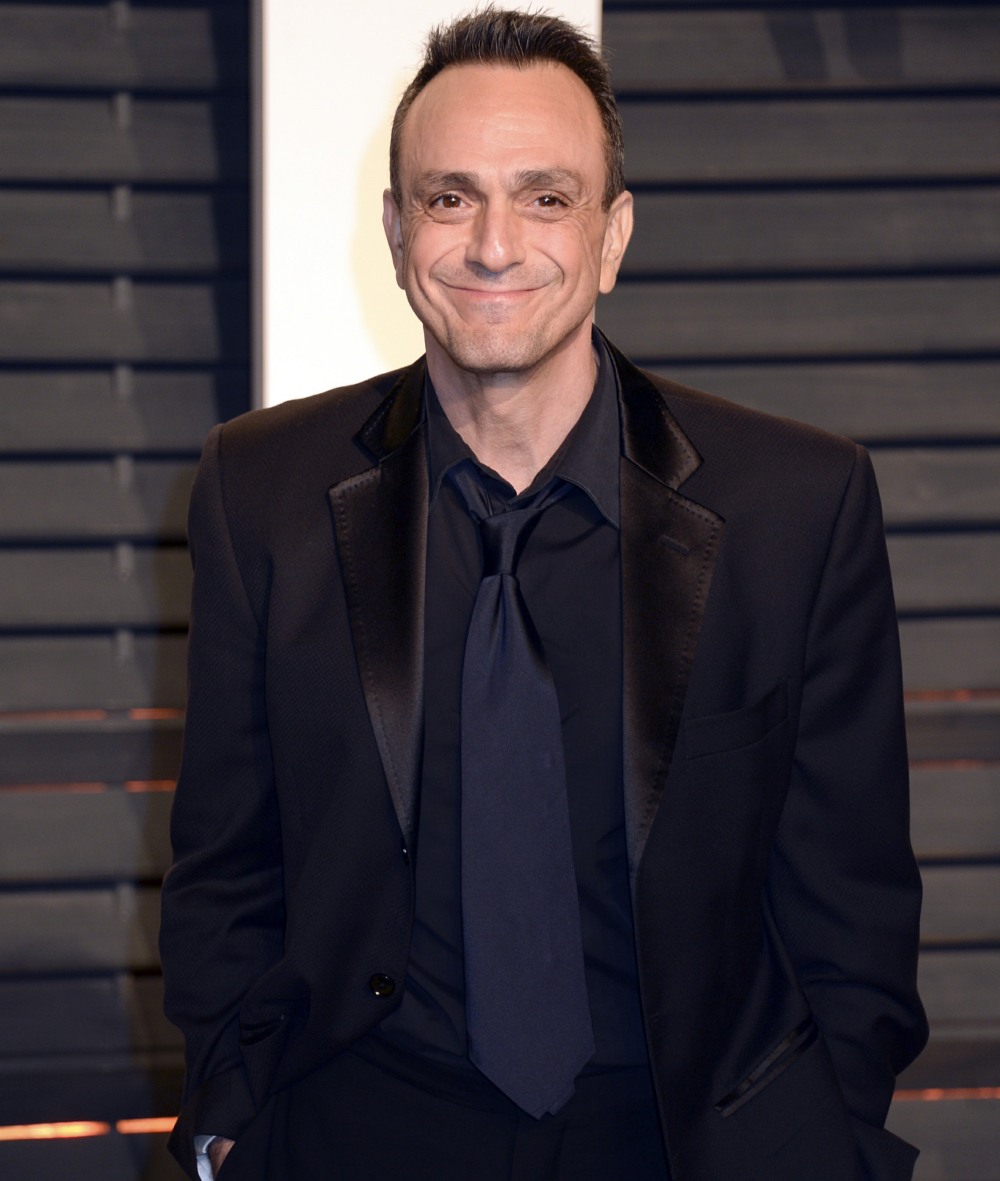For years, everyone on The Simpsons and people in the Indian-American community knew that the Apu character is problematic, and that Hank Azaria’s voice-work for Apu is massively offensive. In 2017, there was even a documentary made about this very subject called The Problem with Apu. Indian-American filmmaker, Hari Kondabolu, spoke to many prominent Indian-Americans about how “Apu” had become a pejorative and how Azaria’s “Apu accent” was used to mock Indian immigrants and their families. Azaria was kind of late in acknowledging how problematic it was, but to be fair… everyone on The Simpsons team was also late in recognizing the problem too. Azaria has a new interview with Dax Shepard on the Armchair Expert and he talks about his long-standing guilt about the character:
Hank Azaria is doing the work. In an interview with Dax Shepard on his podcast “Armchair Expert,” the 56-year-old actor revealed that he’s on a major guilt trip over his longtime role as Kwik-E-Mart shopkeeper Apu Nahasapeemapetilon on “The Simpsons.” Azaria, who no longer voices the controversial character, says he’s taking some unconventional steps to find out why his portrayal was offensive toward the Indian community.
“I was speaking at my son’s school, I was talking to the Indian kids there because I wanted to get their input,” Azaria told Shepard during Monday’s podcast. “A 17-year-old … he’s never even seen ‘The Simpsons,’ but knows what Apu means. It’s practically a slur at this point. All he knows is that is how his people are thought of and represented to many people in this country,” said Azaria, who voices a number of other recurring characters on long-running cartoon, including barman Moe Szyslak, police Chief Wiggum and the snark-filled “Comic Book Guy.” He also stepped down from voicing Carl Carlson, a black character.
“With tears in his eyes,” according to Azaria, the teen asked him to pass the message on to his Hollywood colleagues. “Part of me feels like I need to go to every single Indian person in this country and personally apologize. And sometimes I do.”
Since Monday’s interview, Hari Kondabolu, an American comedian of Indian descent who first called-out “The Simpsons” over their problematic depiction of Indian immigrants in his 2017 documentary “The Problem with Apu,” appears to be making peace with Azaria over the controversy. On Twitter, Kondabou, 38, wrote, “@HankAzaria is a kind & thoughtful person that proves that people are not simply ‘products of their time,’ but have the ability to learn & grow. Nothing. But. Respect,” Kondabolu concluded.
Back in the 1990s especially, “Apu” was practically the only representation of Indian immigrants in America, so it became the sole exposure most white people had to Indians, Indian immigrants and Indian-Americans. It’s painful to think that there are still Indian kids being bullied with the “Apu” slur, and I’m glad that Azaria recognizes that and apologizes. But again, he’s not the only person responsible. So why is he the only one really wearing it?
.@HankAzaria is a kind & thoughtful person that proves that people are not simply “products of their time,” but have the ability to learn & grow. Nothing. But. Respect. https://t.co/e6RmHr2bY9
— Hari Kondabolu (@harikondabolu) April 12, 2021
Photos courtesy of Getty, Fox, Avalon Red.















This! This is why when people use ingrained racism as an excuse for bad behavior from a generation above I call shenanigans. Grace and humility shouldn’t come with demographic exemptions.
Yes, he made a mistake (for decades….) and now he is owning it, growing from it, putting in the work – would it have been better if he never voiced Apu (if Apu was never a character, at least not like that?) of course. but at this point you can’t undo the past so I’m glad that he’s taking the opportunity to change.
There are definitely parts of the Simpsons that I look back on and think – how did anyone think that was okay or funny??
This is another great example of how people don’t understand that racism is more than slurs and language.
““Apu” was practically the only representation of Indian immigrants in America, so it became the sole exposure most white people had to Indians, Indian immigrants and Indian-Americans.”
This was so powerful an example…and it’s so “minor” (a supporting character in a 30 minute cartoon) that most people don’t even notice the insidious way the racism permeates into people’s brains and then society.
I saw a YouTube video on how most Americans views of Native Americans was shaped by country western films of the 50s and 60s, and that zero effort was put into it at all and it was all wrong. They didn’t even have scripts, they just told the actors to “say whatever, it doesn’t matter”.
Not only was having a white man depict a stereotypically exaggerated Indian accent problematic, but wasn’t Apu often depicted as hapless and always having terrible things happen to him? I didn’t watch the Simpsons much growing up but I vaguely remember him always being in situations where he was the butt of the joke.
He wasn’t the butt of the joke, exactly, but he was like a walking stereotype. He was a hard-working, immigrant convenience store owner who was taken advantage of repeatedly by Homer, but always remained jovial. Eventually he had an arranged marriage and a million kids. He was a likable character (not a villain, not stupid), and he was allowed to grow throughout the series, but it still didn’t really sit right. By the time his character was removed from the show, he had very clearly been a throwback to a less sensitive era for a very, very long time.
ETA: The Simpsons does rely broadly on stereotypes a lot of the time (not always ethnic), but Homer is most often the butt of the joke, I think.
Yeah Apu was problematic as hell but he wasn’t always the butt of the joke. Not that I am downplaying the damage done but I actually don’t remember a specific instance where it was particularly mean spirited unlike family guy which, I mean, I didn’t even get the point. It was shock for shocks sake, blatantly racist and it wasn’t even funny.
I haven’t caught an episode in years but wasn’t Apu always the nonthreatening immigrant? That’s what made him “likeable” to potentially racist viewerships.
Yes, exactly. Nonthreatening, nonconfrontational.
I feel it reveals the ignorance of a lot of white people if they looked at Apu and only recognized a satirized accent. Apu is an immigrant who holds a PhD and is a successful business owner. Before he got married, he was considered the most eligible bachelor in Springfield.
Maybe it’s best now if the character is retired or voiced by a South Asian actor. It’s a shame that despite the wonderful qualities of the character, the caricature aspect (on a show full of caricatures) was what received focus.
Hollywood is a fundamentally misogynistic, white supremacist propaganda machine. It reflects and perpetuates social hierarchies. Facts.
Preach, Ginger. To think he is making these comments to problematic Dax Shepard is beyond my comprehension. Just yesterday I was thinking about all of these Hollywood people like Shepard who continually turn their head or get upset if called out. They are as much of the problem as those who are caught being abusive assholes. They perpetuate their own stronghold, unwilling to give up a small piece of the power by making micro-agressions day by day to keep their own place in the system. (Can you tell I just finished reading Caste, and I’m fired up about people doing essentially nothing.)
Hank did a great interview on NPR Fresh Air where he also discussed Apu and his evolution on Apu. They also discussed Hank’s show, Brockmire, which I then watched, which is excellent. Most of the main characters are white, unfortunately, but I feel they handle female and POC characters/storylines with a deft touch.
Hari has a podcast with W Kamau Bell called Politically Reactive. They have a lot of great guests, topics and discussions tho sometimes they are too inside baseball (on being comedians, ppl they know, inside jokes) for me.
Good on Hank for attempting to make amends for all of this, and for being articulate about it.